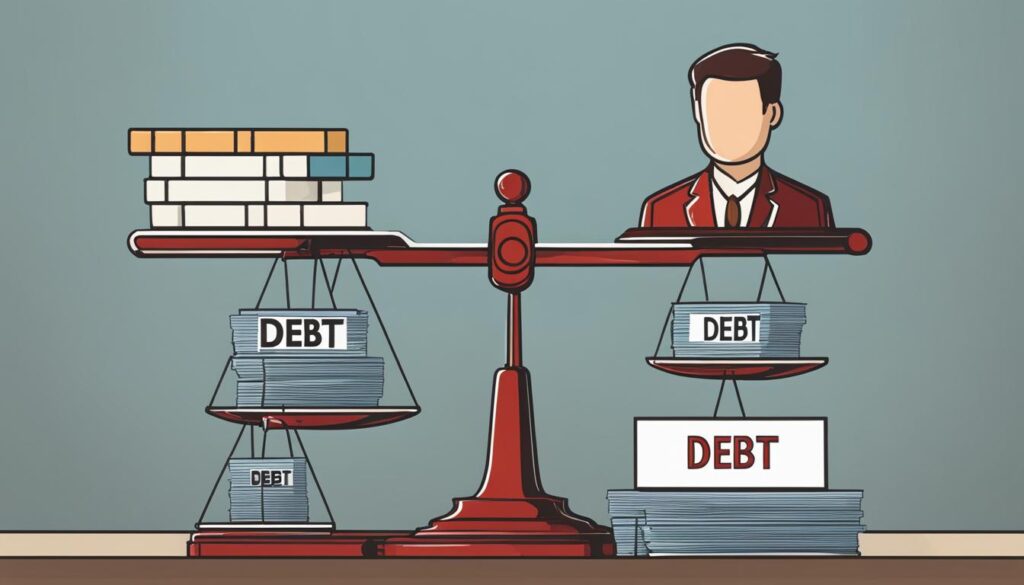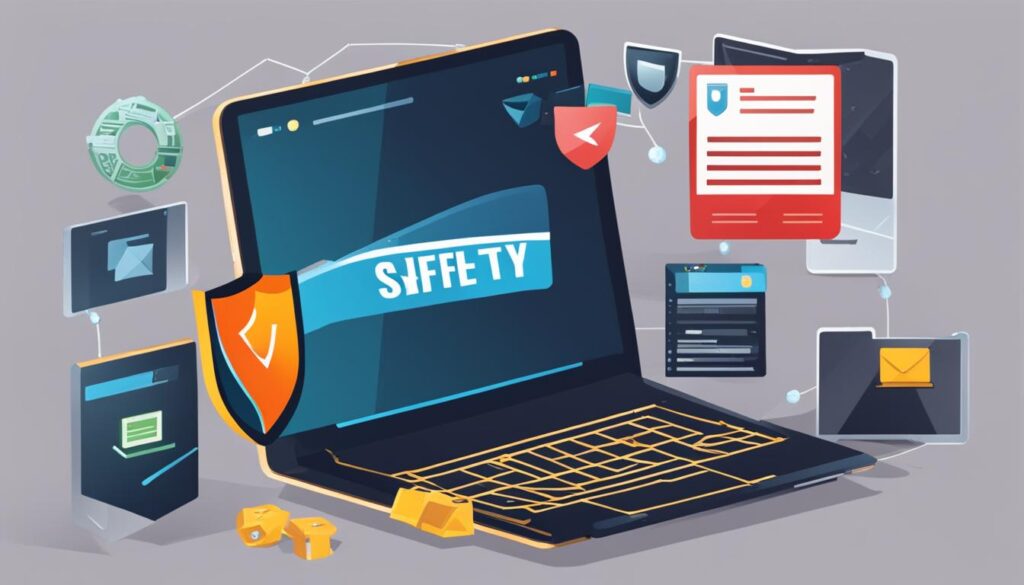Gig work has become increasingly popular, with many individuals turning to side hustles or freelance gigs to supplement their income. However, managing debt can be challenging for gig workers due to irregular income and limited financial stability. In this article, we will explore effective strategies for debt management specifically tailored to the unique needs of gig workers. From understanding credit scores to implementing debt repayment strategies, we will provide practical advice to help gig workers achieve financial freedom and improve their fiscal health.
Key Takeaways:
- Understand the financial challenges of the gig economy and their impact on debt management
- Implement budgeting and cash flow management strategies to track expenses and stabilize income
- Consider establishing an emergency fund to provide a safety net during leaner periods
- Be aware of potential gig work scams and take precautions to protect yourself
- Utilize financial resources and support services dedicated to gig workers’ unique needs
Understanding the Gig Economy and its Financial Challenges
The gig economy has seen a significant rise in recent years, with more individuals opting for flexible work arrangements and taking on gig jobs to earn income. However, this non-traditional work structure comes with its own set of financial challenges. One of the key difficulties faced by gig workers is irregular income.
Gig workers often experience fluctuations in their earnings, which can make it challenging to plan their finances and manage expenses effectively. Unlike traditional employment, where a steady paycheck is guaranteed, gig workers rely on the demand for their services and may face periods of low or no income. This inconsistency can impact their financial stability and make it difficult to meet ongoing financial obligations and debt repayments.
In addition to irregular income, gig workers often lack the benefits and protections associated with traditional employment, such as health insurance, retirement plans, and paid time off. This means they need to allocate a portion of their earnings towards these financial aspects, further complicating their financial situation. Without access to employer-sponsored benefits, gig workers must take additional steps to secure their financial well-being, including finding suitable health insurance coverage, setting up retirement savings accounts, and planning for tax obligations.
Overall, gig workers face unique financial challenges that require careful consideration and proactive strategies. Understanding these challenges is essential for developing effective debt management plans and achieving financial stability in the gig economy.
Strategies for Managing Debt in the Gig Economy
Gig workers face unique challenges when it comes to managing debt due to their irregular income and limited financial stability. However, with the right strategies in place, gig workers can effectively manage their debt and improve their fiscal health.
1. Budgeting
Budgeting is a critical aspect of debt management for gig workers. By creating a comprehensive budget that takes into account their average monthly income and expenses, gig workers can track their spending and ensure that they are living within their means. This allows them to allocate a specific amount towards debt repayment each month and avoid accumulating more debt.
2. Cash Flow Management
Gig workers often experience fluctuations in their income, making it essential to manage their cash flow effectively. Setting aside a portion of their earnings during peak periods can help them create an emergency fund, which serves as a safety net during times of lower income. This emergency fund can be used to cover essential expenses and prevent gig workers from relying too heavily on credit cards or loans during leaner periods.
3. Tax Considerations
Gig workers are responsible for paying their own taxes, so it’s essential to set aside a portion of each payment for tax purposes. By planning ahead and understanding their tax obligations, gig workers can avoid unexpected tax burdens and ensure that they have enough funds to fulfill their tax obligations without relying on credit or loans.
4. Retirement Planning and Healthcare Coverage
While gig workers may not have access to traditional employee benefits such as retirement plans and healthcare coverage, it’s crucial for them to prioritize these aspects of their financial well-being. Gig workers should explore options like opening an individual retirement account (IRA) and purchasing health insurance to protect their long-term financial security and mitigate potential healthcare costs.
Implementing effective credit management strategies, such as paying bills on time and keeping credit utilization low, is also crucial for gig workers to maintain a good credit score. This will enable them to access affordable credit when needed and avoid high interest rates that can exacerbate their debt burden.
Finally, finding a balance between work and personal life is essential for gig workers to avoid burnout and enhance their overall well-being. Prioritizing self-care, setting boundaries, and taking time off when needed can contribute to a healthier work-life balance and promote better financial decision-making.

Table: Debt Management Strategies for Gig Workers
| Strategy | Description |
|---|---|
| Budgeting | Create a comprehensive budget to track income and expenses, allocate funds for debt repayment. |
| Cash Flow Management | Set aside a portion of earnings during peak periods to create an emergency fund for leaner periods. |
| Tax Considerations | Plan ahead and set aside funds for taxes to avoid unexpected tax burdens. |
| Retirement Planning and Healthcare Coverage | Explore options like individual retirement accounts (IRAs) and health insurance to protect long-term financial security. |
| Credit Management | Prioritize timely bill payments and maintain a low credit utilization to maintain a good credit score. |
| Work-Life Balance | Prioritize self-care and set boundaries to avoid burnout and make better financial decisions. |
Navigating Gig Work Scams and Financial Risks
The gig economy has brought about new opportunities for individuals to earn income through gig work. However, along with the advantages come risks, including gig work scams and potential financial frauds. Gig workers need to be cautious and aware of these risks to protect themselves and their financial well-being.
One of the most common types of scams in the gig economy is job scams. These scams often involve fake job postings or offers that require upfront payments or personal information before any work is done. Gig workers should be wary of any gig job that asks for payment or personal details before they have secured the job.
Protecting online safety is crucial for gig workers. Scammers may attempt to gather personal information or financial details through phishing emails or fake websites. Gig workers should always verify the legitimacy of any company or platform they are working with and ensure that online transactions are secure.
Gig workers should always remember the saying, “If it sounds too good to be true, it probably is.” Trusting gut instincts and conducting thorough research can help avoid falling victim to gig work scams and financial risks.
By staying vigilant and taking necessary precautions, gig workers can minimize the risks associated with gig work scams and maintain their financial security. Awareness of job scams, online safety, and the importance of verifying the legitimacy of gig opportunities are essential for gig workers to navigate the gig economy successfully.
Tips for Navigating Gig Work Scams and Financial Risks
- Research companies and platforms thoroughly before accepting gig work offers
- Avoid upfront payments or providing personal information until a job offer is secured
- Verify the legitimacy of gig opportunities and check for any warning signs of scams
- Stay updated on online safety practices and ensure secure transactions
- Trust instincts and be cautious of offers that seem too good to be true
- Report any suspicious activity or scams to relevant authorities or platforms
| Gig Work Scams | Financial Risks |
|---|---|
| Fake job postings | Phishing scams |
| Upfront payment requests | Identity theft |
| Fake platforms or companies | Financial fraud |
| Personal information theft | Unauthorized transactions |
Being proactive in understanding gig work scams and financial risks is crucial for gig workers. By staying informed, practicing caution, and utilizing available resources, gig workers can protect themselves from scams and maintain their financial security in the gig economy.

Utilizing Financial Resources and Support for Gig Workers
Gig workers face unique financial challenges and managing debt can be particularly difficult without the stability of a traditional job. However, there are resources and support services available specifically tailored to the needs of gig workers. These resources can provide valuable assistance in budgeting, debt management, credit improvement, student loan repayment, and counseling services, helping gig workers navigate their financial obligations and achieve greater financial security.
One important resource for gig workers is professional counseling services. These services can offer guidance and support in developing effective budgeting strategies, managing debt, and improving credit scores. A counselor can work with gig workers to create a personalized plan based on their specific financial situation, helping them take control of their finances and make informed decisions.
Additionally, there are financial organizations that specialize in providing support for gig workers. These organizations offer a range of services, including free financial education workshops, debt management assistance, and access to low-interest loans. By utilizing these resources, gig workers can gain valuable knowledge and tools to effectively manage their finances and reduce their debt burden.
| Financial Resource | Services Offered |
|---|---|
| Gig Worker Financial Counseling | – Personalized budgeting and debt management plans – Credit improvement strategies – Student loan repayment guidance |
| Gig Worker Support Organization | – Financial education workshops – Debt management assistance – Access to low-interest loans |
By taking advantage of these financial resources and support services, gig workers can gain the knowledge, tools, and assistance necessary to effectively manage their finances and overcome the challenges of irregular income and fluctuating financial stability. With the right guidance and support, gig workers can improve their financial well-being, achieve their debt management goals, and ultimately thrive in the gig economy.
Conclusion
Successfully managing debt as a gig worker requires a proactive approach and tailored strategies. By understanding the challenges of the gig economy, implementing effective debt management strategies, and utilizing financial resources and support, gig workers can achieve financial freedom and improve their fiscal health.
With careful budgeting, cash flow management, and responsible credit and debt management, gig workers can navigate the financial landscape of gig work and build a solid foundation for their financial future. By staying informed about tax considerations, retirement planning, healthcare coverage, and credit management, gig workers can make informed decisions that contribute to their long-term financial well-being.
Remember, taking proactive steps towards debt management is essential for long-term financial success in the gig economy. By adopting these strategies and utilizing available resources, gig workers can reduce the burden of debt, enhance their financial freedom, and achieve a healthier fiscal outlook.
FAQ
What is gig work?
Gig work refers to on-demand work, services, or goods provided through digital platforms. It includes various types of work such as ride-sharing, food delivery, freelance writing, and online selling.
Why is managing debt challenging for gig workers?
Gig workers often have irregular income and limited financial stability, making it difficult to manage consistent debt repayment. Additionally, gig work may lack benefits such as employer-sponsored retirement plans or healthcare coverage, adding to the financial burden.
What strategies can gig workers use for effective debt management?
Gig workers can adopt strategies such as budgeting, managing cash flow, establishing an emergency fund, understanding tax considerations, planning for retirement, addressing healthcare and insurance needs, implementing effective credit management, and considering investments.
What precautions should gig workers take to avoid gig work scams?
Gig workers should research companies, talk to trusted individuals, avoid upfront payments, and not provide confidential information until hired. They should also be aware of online safety and security to minimize financial risks associated with gig work scams.
Are there financial resources and support services available for gig workers?
Yes, there are organizations that offer free, confidential support with budgeting, debt management, credit improvement, student loan repayment, and counseling services specifically tailored for gig workers. These services provide professional guidance and nonjudgmental support in achieving financial goals.
How can gig workers achieve financial freedom and improve their fiscal health?
By understanding the unique challenges of the gig economy, implementing effective debt management strategies, and utilizing financial resources and support, gig workers can achieve financial freedom. This includes careful budgeting, cash flow management, responsible credit and debt management, and taking proactive steps towards debt management for long-term financial success in the gig economy.
How Can Effective Budgeting Help Gig Workers Manage Their Debt?
Effective budgeting is crucial for gig workers to manage their debt. Tailored budgeting for gig workers allows them to better understand their income streams, prioritize expenses, and allocate funds towards debt repayment. By developing a clear financial plan, gig workers can actively control their debt and build a solid foundation for their financial stability.
How Can Gig Workers Effectively Manage Debt While Building and Maintaining Credit?
Gig workers can effectively manage debt while building credit in gig economy by creating a detailed budget, prioritizing high-interest debt, and making timely payments. It’s also important to diversify income streams and seek out loans or credit cards designed for freelancers. Tracking credit scores regularly is beneficial for maintaining good credit.
Source Links
- https://www.lssmn.org/financialcounseling/blog/three-tips-being-a-successful-gig-worker-a-gig-economy
- https://www.fool.com/the-ascent/personal-finance/articles/55-of-gig-workers-live-paycheck-to-paycheck-heres-why-thats-dangerous/
- https://www.linkedin.com/pulse/effective-strategies-navigate-your-personal-finances-gig-leon-a-mann


Pingback: Future-Proof Finances: Retirement Planning for Gig Workers! – Straight Fire Money